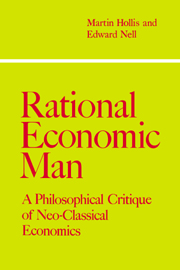Book contents
- Frontmatter
- Contents
- Preface
- Introduction
- 1 Relevance and falsification
- 2 Rational economic man
- 3 Theory and hypothesis
- 4 Facts and theories
- 5 Behaviour and prediction
- 6 A priori knowledge
- 7 Deductive explanation
- 8 The assumptions of neo-Classicism
- 9 Rationalist foundations for economic theory
- Bibliography
- Index
- Frontmatter
- Contents
- Preface
- Introduction
- 1 Relevance and falsification
- 2 Rational economic man
- 3 Theory and hypothesis
- 4 Facts and theories
- 5 Behaviour and prediction
- 6 A priori knowledge
- 7 Deductive explanation
- 8 The assumptions of neo-Classicism
- 9 Rationalist foundations for economic theory
- Bibliography
- Index
Summary
The riddle of Induction is often posed by philosophers in wholly general terms. How do we know that any observed correlations will be found to hold in as yet unobserved cases? As Robbins once remarked ‘however accurately [economic generalisations] describe the past, there is no presumption that they will describe the future’. Such dark threats of universal scepticism rarely impress those who are not philosophers and so we also gave a more specific version of the riddle in our introduction. How are we to discriminate ‘projectible’ generalisations from mere correlations which just happen to have held in hitherto observed cases? Neither version arises, until we know which correlations have held in the past and, as we argued in the last chapter, a positivist cannot even assemble the candidates. Nevertheless we shall now put this awkward nolle prosequi on one side and turn to the problem of determining which generalisations are projectible. The question, we shall argue, is one about the relation of theory to hypothesis.
Received opinion has it that theory and hypothesis differ importantly in kind and that a hypothesis is strengthened by the endorsement of a good theory. Indeed any other view might seem a slap at the professional dignity of economists. A theory is surely a complex conceptual apparatus and so more than any mere bundle of hypotheses. If a generalisation is treated as a confirmed hypothesis, then it is projectible when endorsed by the imprimatur of theory. As hinted towards the end of the last chapter, the introduction of maximising models, whatever their particular merits, is surely the right sort of move to make. For such models presuppose an instinctive distinction between theory and hypothesis,
- Type
- Chapter
- Information
- Rational Economic Man , pp. 65 - 94Publisher: Cambridge University PressPrint publication year: 1975



